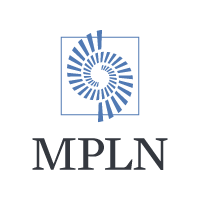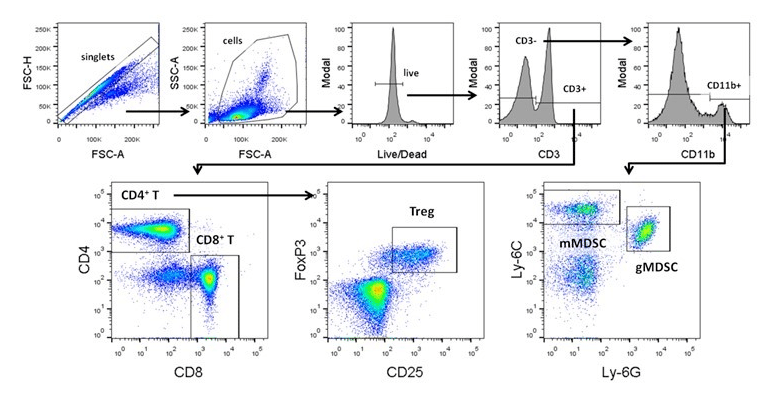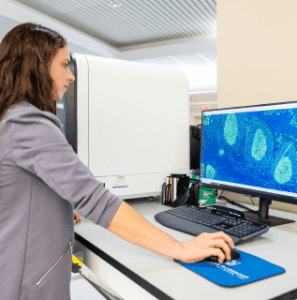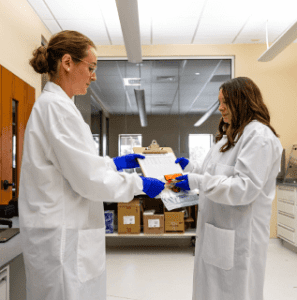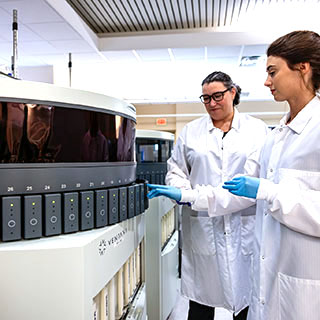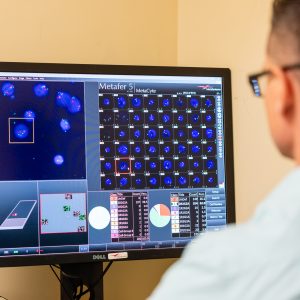Case Study
Unusual Acute Promyelocytic Leukemia, reflexed for FISH analysis; t(15;17) positive.
- Histogram 1: Promyelocytes isolated by SSC v CD45
- Histogram 2: CD34 negative/CD117 positive promyelocytes (expected)
- Histogram 3: CD11b negative (expected), HLA DR positive (unusual). The specimen was reflexed for PML/RARA fusion by fluorescence in situ hybridization and was positive.
Comprehensive Panels
Samples are received and processed by experienced laboratory personnel per established, validated protocols and guidelines. Screening antibody panels for all sample types are designed to reliably detect abnormal populations. The comprehensive panel includes markers for adequate characterization of all cell lines. Additional testing, as indicated, may be used to further and fully characterize any abnormal cells detected.
Samples are received and processed by experienced laboratory personnel per established, validated protocols and guidelines. Screening antibody panels for all sample types are designed to reliably detect abnormal populations. The comprehensive panel includes markers for adequate characterization of all cell lines. Additional testing, as indicated, may be used to further and fully characterize any abnormal cells detected.
Unique Approach to Data Analysis
Many laboratories use basic analysis techniques and provide pathologists with pre-printed histograms; this approach, although common, is less than optimal. At MPLN, the raw (list mode) data is independently analyzed by a hematopathologist with experience at a level not routinely offered by other laboratories. After sample processing and appropriate quality review with respect to sample, reagent and instrument parameters, the list mode data is analyzed by the hematopathologist. Previous patient results, history and clinical information are incorporated in the analysis, and possible ancillary testing (FISH, cytogenetics, molecular, etc.) is considered.
Many laboratories use basic analysis techniques and provide pathologists with pre-printed histograms; this approach, although common, is less than optimal. At MPLN, the raw (list mode) data is independently analyzed by a hematopathologist with experience at a level not routinely offered by other laboratories. After sample processing and appropriate quality review with respect to sample, reagent and instrument parameters, the list mode data is analyzed by the hematopathologist. Previous patient results, history and clinical information are incorporated in the analysis, and possible ancillary testing (FISH, cytogenetics, molecular, etc.) is considered.

In-Depth Report
The report is designed to convey clinically relevant information in an easy to read format. The findings address sample quality, sample cellularity, and quantitation and characterization of all major cell lines. When present, abnormal populations are clearly described, including cell type, percentage of involvement, cell size, and immunophenotypic features. The interpretation is written to address clinically relevant issues based on the provided information, previous studies at MPLN, and dialogue with the submitting physician. Ancillary testing is discussed with the client, when indicated, to maximize clinical information from the submitted sample.
The report is designed to convey clinically relevant information in an easy to read format. The findings address sample quality, sample cellularity, and quantitation and characterization of all major cell lines. When present, abnormal populations are clearly described, including cell type, percentage of involvement, cell size, and immunophenotypic features. The interpretation is written to address clinically relevant issues based on the provided information, previous studies at MPLN, and dialogue with the submitting physician. Ancillary testing is discussed with the client, when indicated, to maximize clinical information from the submitted sample.
Communication with Hematopathologist
A hematopathologist is available to discuss any questions related to hematopathology samples. Additionally, we welcome suggestions to help us improve our service, and we actively seek suggestions to help achieve our goal of providing accurate, reliable and clinically relevant data in a timely fashion. If you want to discuss any of the above topics or specific results, feel free to call.
A hematopathologist is available to discuss any questions related to hematopathology samples. Additionally, we welcome suggestions to help us improve our service, and we actively seek suggestions to help achieve our goal of providing accurate, reliable and clinically relevant data in a timely fashion. If you want to discuss any of the above topics or specific results, feel free to call.
